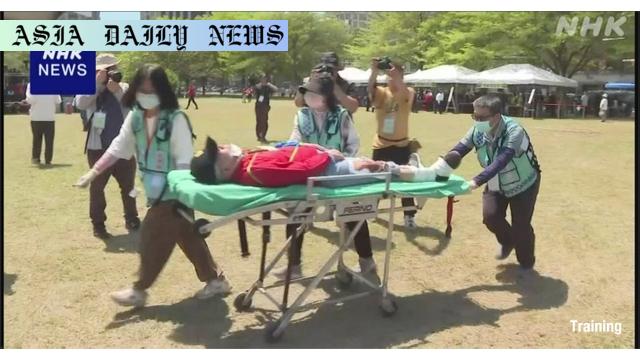Emergency Preparedness – Taiwan conducts a large-scale drill involving over 1,500 participants to showcase disaster readiness.
Emergency Preparedness Drill held in Tainan, Taiwan.
Scenario based on port explosion and tsunami simulation.
Over 1,500 participants, showcasing robust response strategies.
Attended by officials from the US and other nations.

Introduction: The Significance of Emergency Preparedness
In an increasingly volatile world, the importance of emergency preparedness cannot be overstated. From natural disasters to unforeseen emergencies, countries around the globe are striving to create systems and responses that ensure the safety and security of their citizens. Taiwan, an island nation often under geopolitical pressure, recently took a significant step towards boosting its disaster preparedness. The large-scale emergency drill conducted in Tainan reflects both the government’s commitment to readiness and its desire to instill confidence within its population.
The Details of the Tainan Drill
The drill, conducted in the southern city of Tainan, revolved around a hypothetical worst-case scenario—a devastating explosion at a port building coupled with a tsunami. Such a realistic simulation allowed the participants to engage in critical emergency operations. Over 1,500 individuals, including police personnel, firefighters, and civilian volunteers, took part in the comprehensive exercise. The scope of the drill ranged from triaging and treating casualties to establishing a disaster response center, showcasing a carefully orchestrated plan for managing chaos and minimizing harm.
Participants practiced categorizing patients based on injury severity—a vital aspect of any large-scale disaster response. The drill also involved setting up disaster-response infrastructure, further highlighting the importance of coordination and resource management. Additionally, officials from over 10 countries, including the United States, were present to observe Taiwan’s efforts, a symbolic gesture that underscores the island nation’s global connections amidst geopolitical tensions.
President Lai Ching-te’s Vision for a Secure Taiwan
President Lai Ching-te, who attended the drill, stressed the broader vision of national security beyond military measures. According to Lai, a strong society-wide capability to react to disasters is a cornerstone of Taiwan’s security strategy. By emphasizing the role of emergency preparedness, the president seeks to not only protect citizens from natural calamities but also bolster their confidence in Taiwan’s ability to handle crises.
In the context of persistent military maneuvers by China near Taiwan, this initiative holds special significance. Inviting international observers to witness the drill conveys Taiwan’s resilience and determination to safeguard its interests despite external pressures. It is a message that readiness is crucial both for civilian safety and geopolitical stability.
Global Implications of Taiwan’s Emergency Readiness
Thursday’s exercise extends beyond its practical implications, touching on Taiwan’s global diplomatic relationships. By welcoming officials from countries supportive of Taiwan, the nation demonstrated its openness to collaboration and mutual learning. This cooperation reinforces Taiwan’s image as a responsible international actor, willing to share its expertise in crisis management and disaster response.
The inclusion of civilian volunteers is another standout feature of the drill, emphasizing the power of community engagement in disaster responsiveness. This bottom-up approach, alongside top-down government initiatives, fosters resilience at every level of society. By integrating diverse participants into the exercise, Taiwan underscored that national security is not solely the military’s responsibility but a shared mission requiring active participation.
Conclusion: Taiwan’s Leading Example in Preparedness
The Tainan drill sets a noteworthy example of how a nation can combine expertise, resourcefulness, and collaboration to prepare for emergencies. Taiwan’s focus on readiness—both through realistic scenarios and active engagement—should serve as an inspiration for countries worldwide. As climate change exacerbates the frequency and severity of natural disasters, investments in such detailed and inclusive emergency preparedness programs are becoming indispensable.



Commentary
Emergency Readiness: An Indicator of Resilience
Taiwan’s recent emergency drill in Tainan highlights an essential aspect of national security that often gets overshadowed by military concerns. While defense strategies are undoubtedly crucial, security also relies heavily on a nation’s ability to protect its citizens during disasters and emergencies. This multi-layered approach enables Taiwan to emerge as a strong and prepared nation in the face of both natural and human-made challenges.
Community Participation as a Strength
What stood out most during the Tainan emergency drill was the active involvement of over 1,500 participants, spanning law enforcement, firefighters, and everyday civilian volunteers. This diverse participation highlights the critical role of communities in emergency response and rehabilitation efforts. By creating opportunities for citizens to engage in such meaningful ways, governments can tap into collective intelligence while building a culture of self-reliance and cooperation.
This approach not only strengthens the sense of civic duty among citizens but also reinforces the idea that national security is a shared responsibility. Taiwan’s strategy to include civilian volunteers as key participants in simulated disaster scenarios sets a remarkable example for other countries to emulate.
A Powerful Message to the World
The presence of international observers adds a layer of diplomatic significance to the drill. By opening its doors to officials from the US and other nations, Taiwan sent out a powerful message of solidarity, transparency, and a commitment to global collaboration. Such gestures can serve to enhance goodwill while also fostering an environment in which countries can learn from each other’s experiences and methodologies.
Overall, Taiwan’s emphasis on emergency preparedness underscores the importance of viewing security from a holistic perspective. By prioritizing readiness and cooperation, the island nation is not only safeguarding its own interests but also contributing to a broader understanding of disaster management on the global stage.